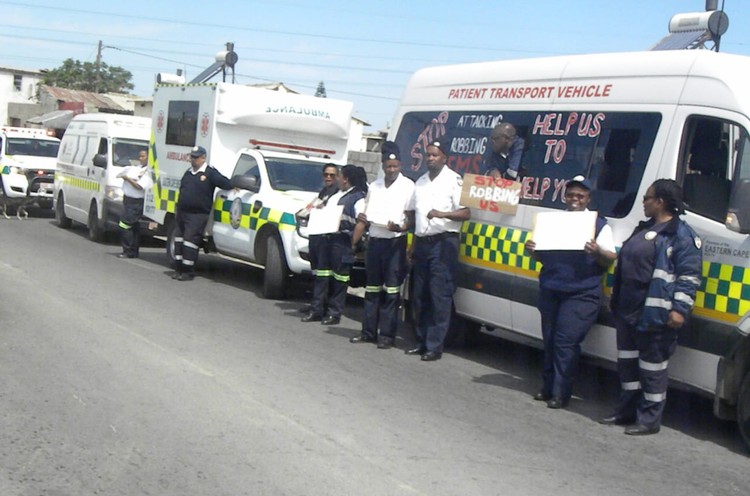MEC promises better security for ambulance drivers
Emergency workers return to PE townships
Eastern Cape ambulance drivers and their assistants are servicing Port Elizabeth’s townships again after boycotting them for a week out of fear for their lives.
The drivers demanded police escorts but the police said they were overwhelmed and it was not part of their mandate to escort ambulances.
Emergency Medical Services (EMS) staff are concerned that communities are failing to protect them against criminals while they attend to patients. They have also complained that they have been assaulted by residents when taking long to arrive to emergency scenes.
EMS workers in the past week ran an awareness campaign in townships, educating residents about the importance of ambulances.
Health MEC Sindiswa Gomba met EMS workers on Wednesday at Dora Nginza Hospital. Some police station and municipal councillors also attended.
Describing measures to be taken, Gomba said EMS staff would carry body cameras on them and emergency vehicles would be fitted with cameras linked to the control room. The control room would be revamped and staff trained to communicate better. Push-to-talk buttons (a cell phone communication system that can communicate simultaneously with many people) would be installed in all vehicles by 18 October.
She also said more ambulances would be added and drivers would be trained in advanced driving to escape from dangerous situations. “We are proposing you carry pepper spray for defensive purposes. Ambulance windows will be protected with shatterprufe glass to deflect thrown objects like bricks and stones.”
Signage on the outside of vehicles would make it clear that no money or valuables are inside.
Gomba also proposed that ward councillor and committee members’ contact details be kept in the control room, so that they could be notified of the presence of ambulances in their areas.
She urged community leaders to educate residents about the importance of ambulances.
Gomba said the department would also test the decentralisation of ambulances to speed up getting ambulances to patients. Decentralisation means keeping some ambulances at clinics rather than a single location. But Gomba said this could not be a permanent solution because it was not safe to keep ambulances at some clinics and decentralisation demanded extra administrative staff.
A control room operator said she would prefer ambulances to be decentralised to reduce community anger. She said at present ambulances were stationed at Dora Nginza Hospital,far away from places like Motherwell and Ikamvelihle.
Next: NLC response to Sershan Naidoo’s allegations
Previous: Three things you should know to avoid being evicted
© 2019 GroundUp.
This article is licensed under a Creative Commons Attribution-NoDerivatives 4.0 International License.
You may republish this article, so long as you credit the authors and GroundUp, and do not change the text. Please include a link back to the original article.



